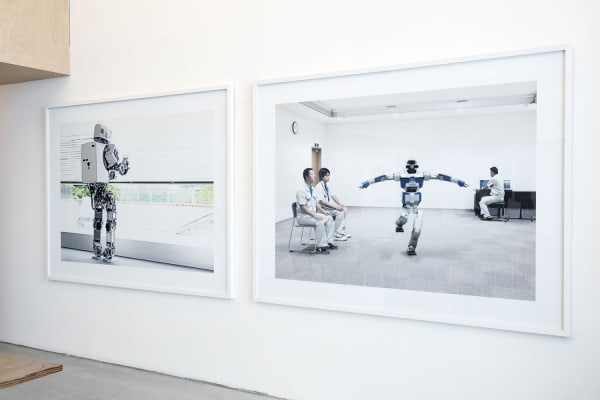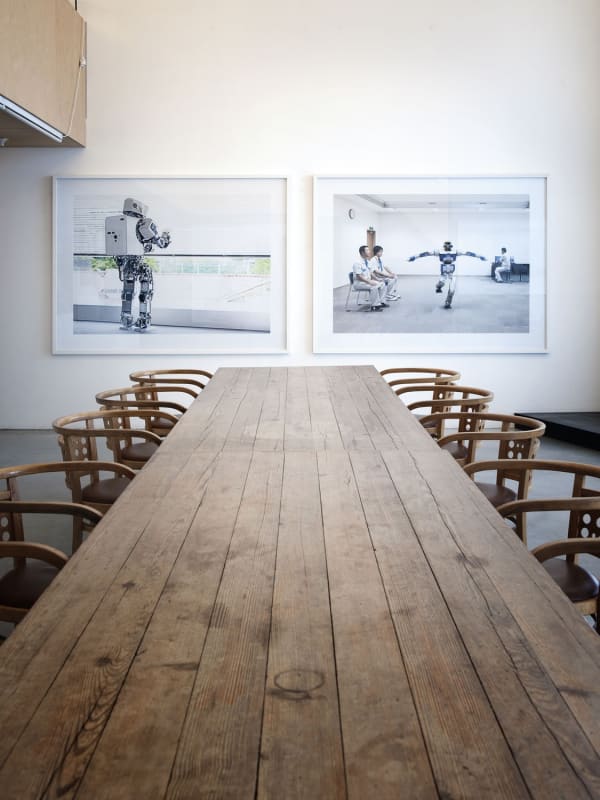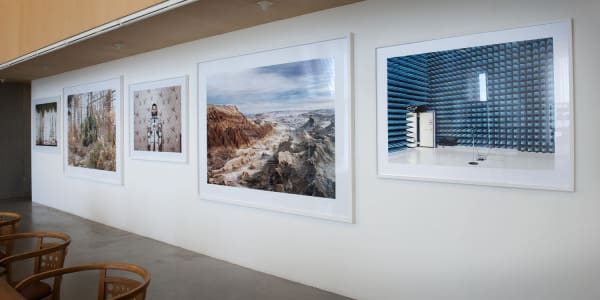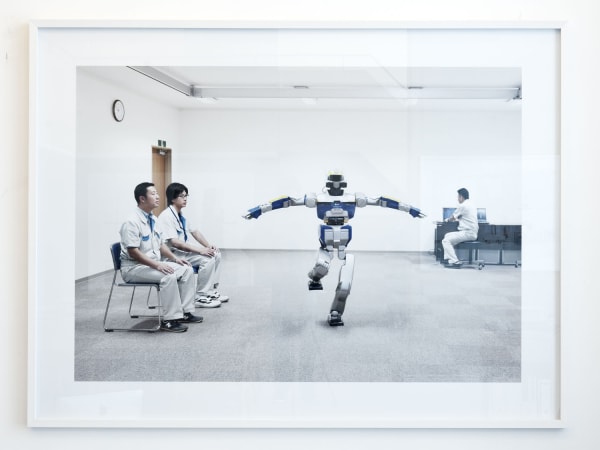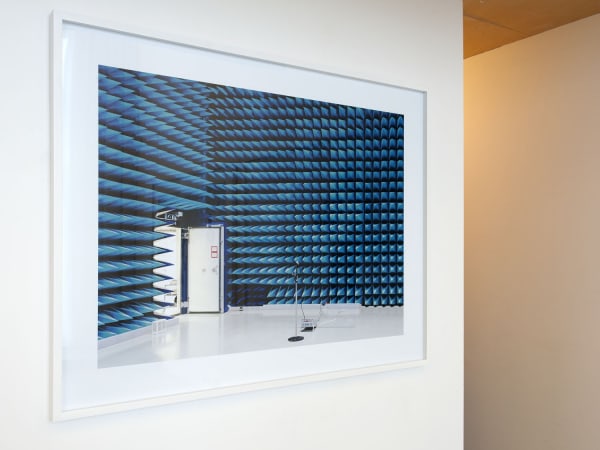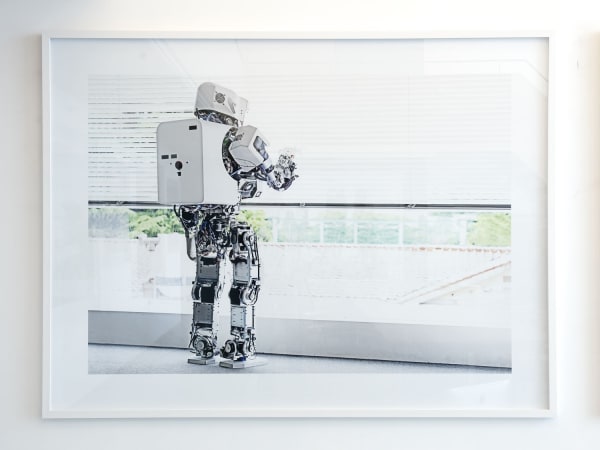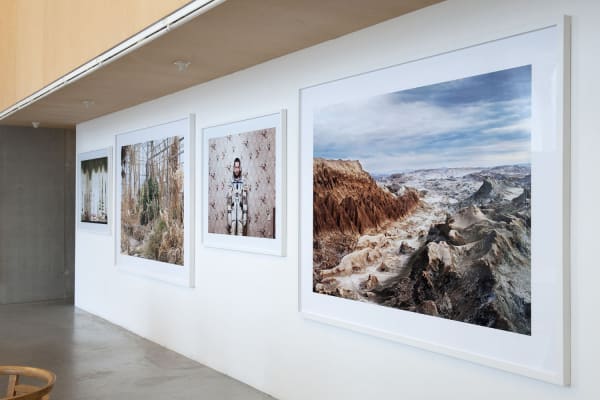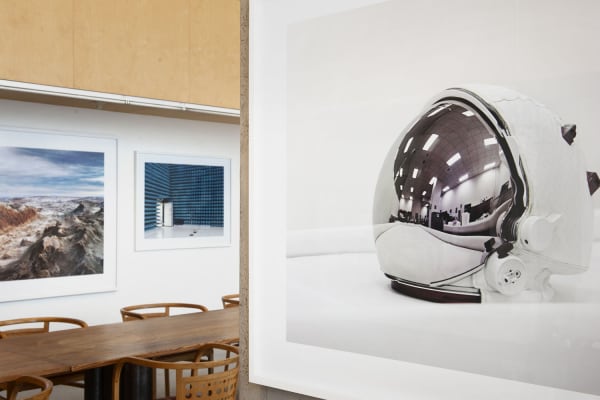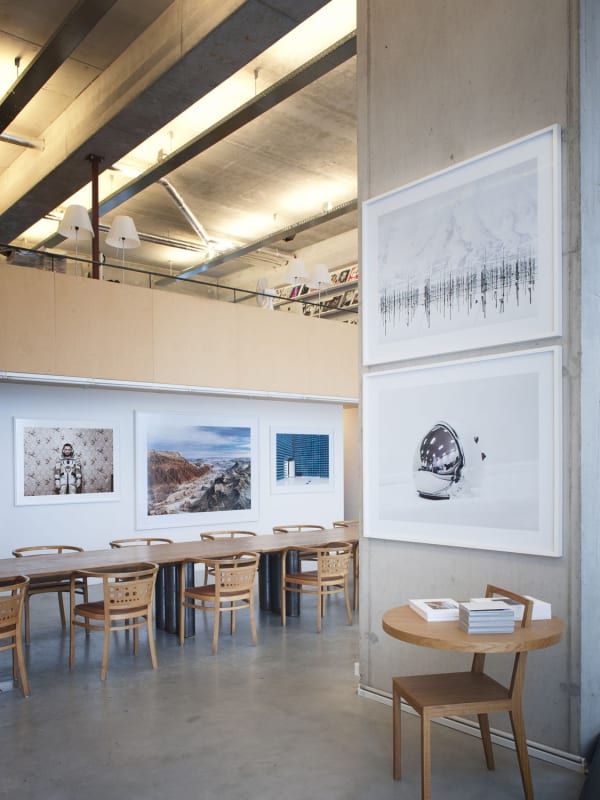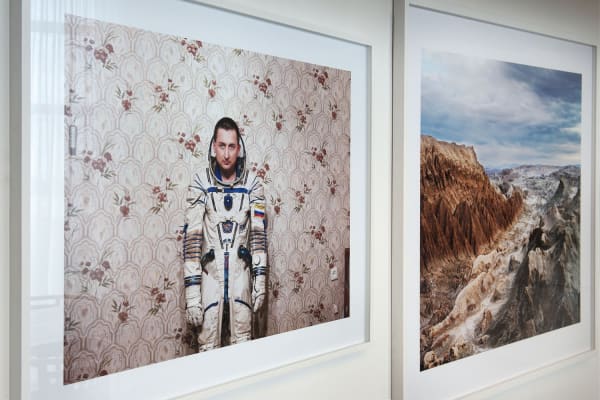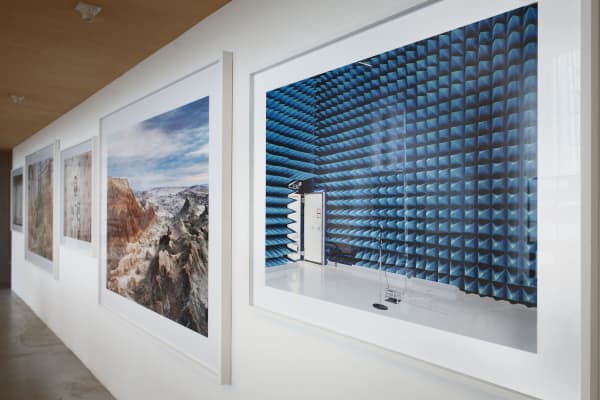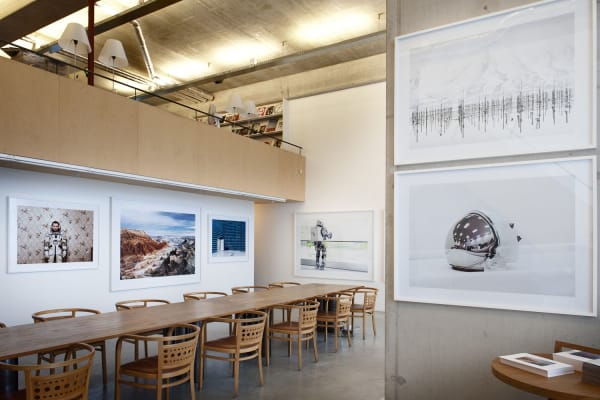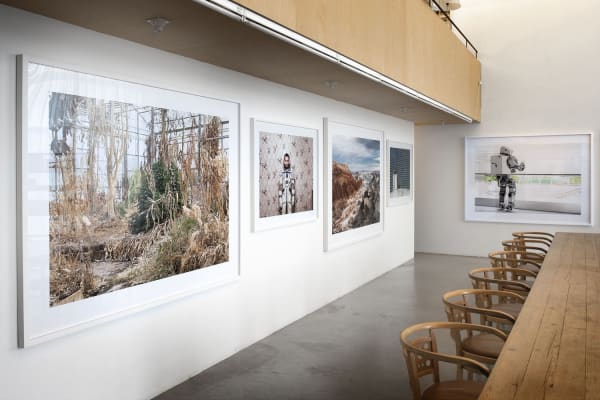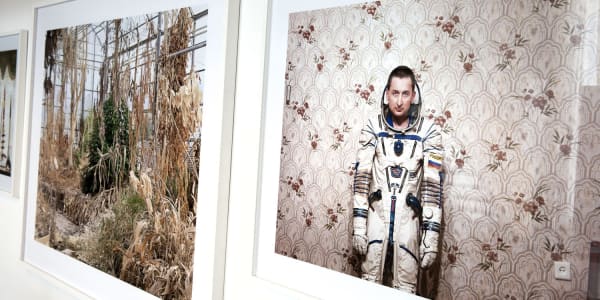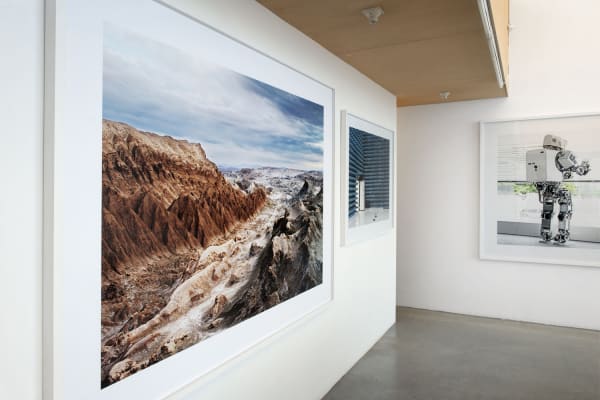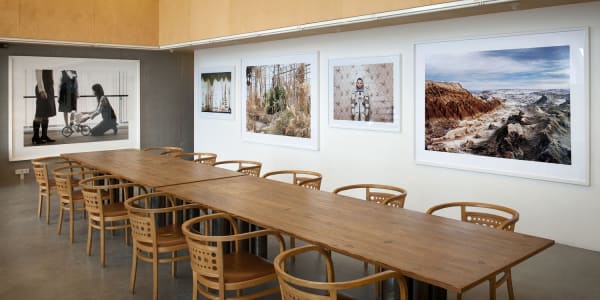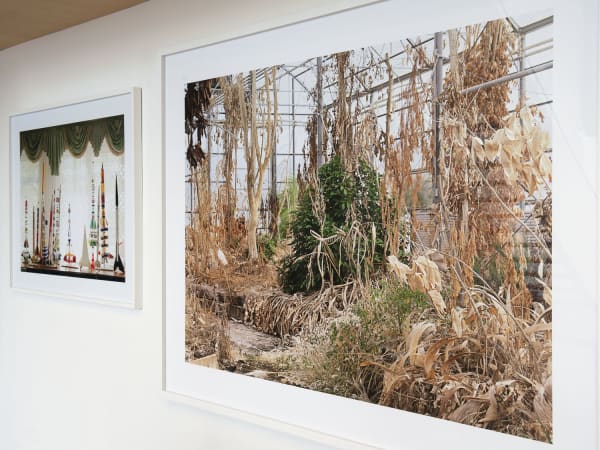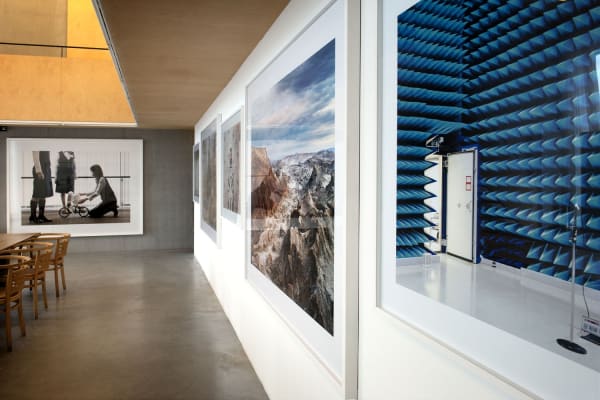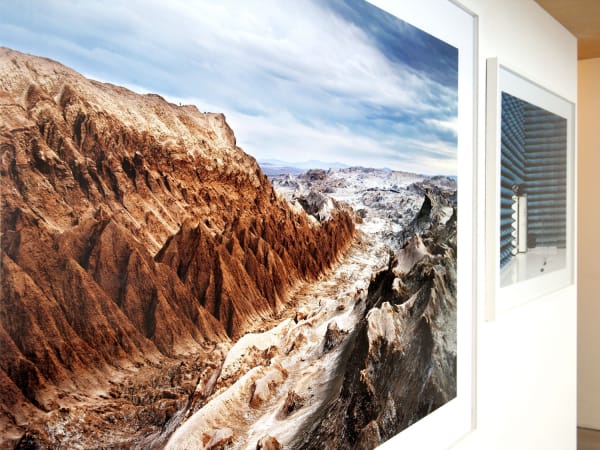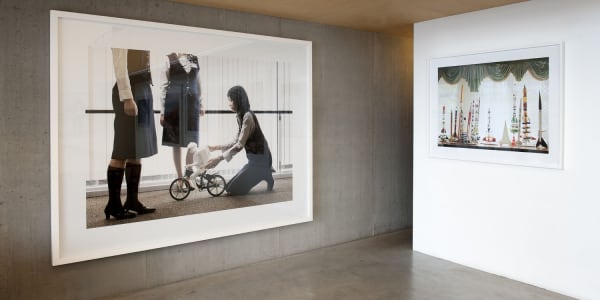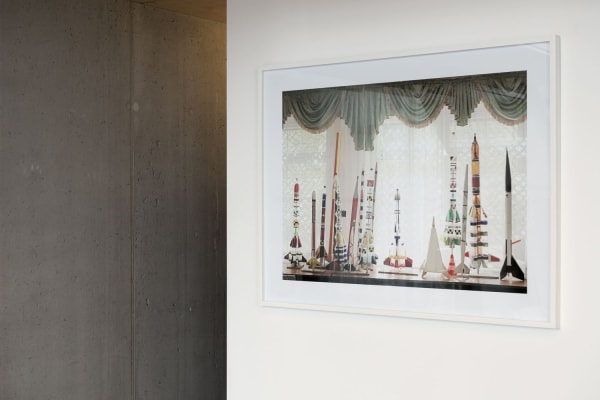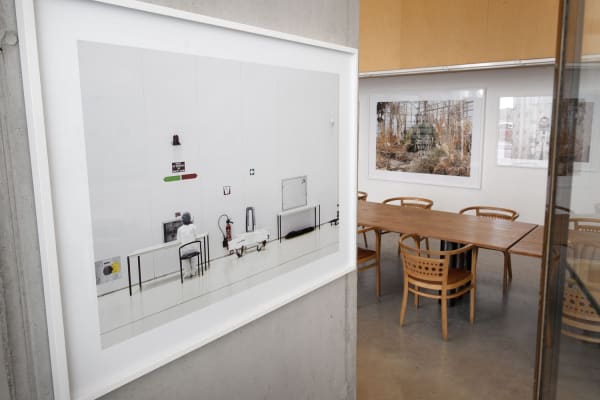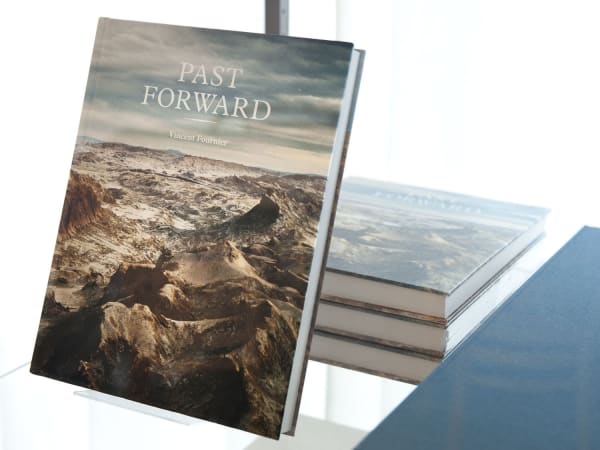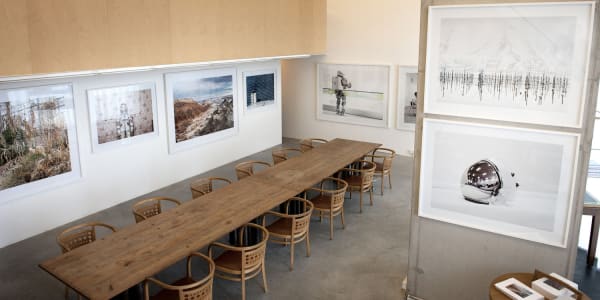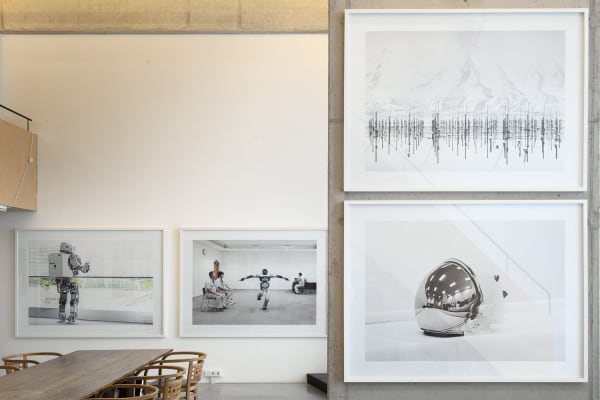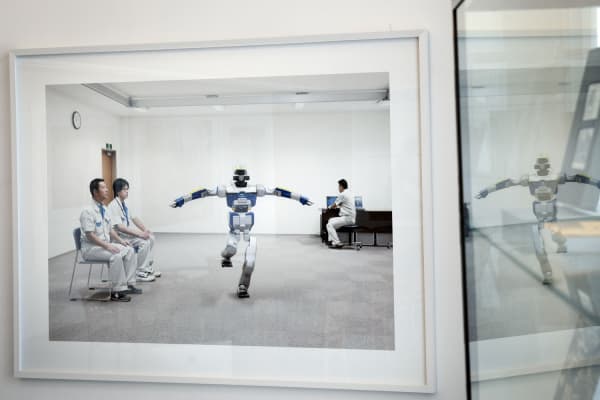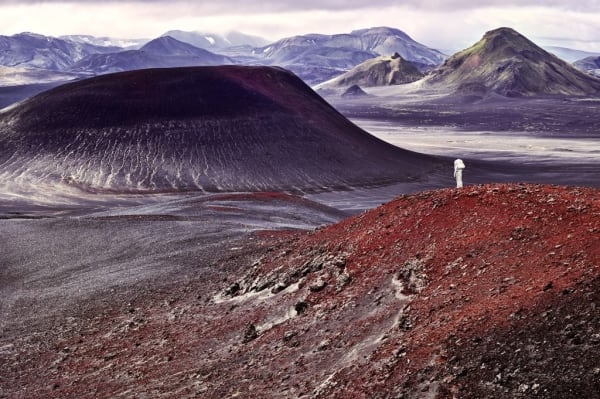'Past Forward': Vincent Fournier
In September 2014, The Ravestijn Gallery presented photographer Vincent Fournier’s work from his uncanny series ‘Space Project’ and ‘The Man Machine’ (2012). Shown for the first time in the Netherlands, these two series consider space and technology as still undiscovered countries on Earth.
With ‘Space Project’, Fournier photographs space training facilities in different locations around the world. Images of gleaming shuttle and satellite equipment contrast sharply with retro auditoriums, classrooms displays and hallowed accessories from Soviet cosmonauts. The series as a whole, together with stunning desert and arctic research locations, renders space and time as something not yet integrated into our own world. ‘The Man Machine’ looks from a closer range at the intersections between science fiction, robots and contemporary society. Humorous, touching and at times unsettling, Fournier stages various scenarios in which machine and man interact not without a tangible sense of awkwardness.
Important questions arise from Fournier’s work: how is our environment shaped to accommodate visions of other worlds? To what extents do unfamiliar machines and scenarios square with visions of the future? What are the rules of engagement for this new world? Can the future be defined in one to one terms with our present day realities? These questions are made all the more complex since so many of the photographs appear as if out of a dream or a childhood science fiction fantasy.
Throughout his career Vincent Fournier has developed a unique photographic style best described as retro-futuristic. His documentations of machines, technologies and ambitions for the future are photographed often through the veil of the 1970s: a Russian cosmonaut poses in front of faded floral wallpaper, replicas and models stand unused; the machinery and facilities in many images appear outdated, framed with a certain distance and foreignness that seem to originate from the past. In a time when technologies on Earth have eclipsed earlier dreams of space travel and invention, Fournier’s images seem archival, like relics. ‘Space Project’ and ‘The Man Machine’ give the viewer pause by instilling technologies meant to explain outer space and the future with their own alien qualities.
Vincent Fournier (FR) was born in 1971 in Ouagadougou, Burkina Faso, where he spent the first five years of his life before moving to France. He earned degrees in sociology and visual arts and then studied photography at the National School of Photography in Arles. An overview of four recent works entitled Past Forward was published in 2012. This is his second solo exhibition at Ravestijn Gallery.
-
![Vincent Fournier, Anechoic Chamber, European Space Research and Technology Centre [ESTEC], Noordwijk, The Netherlands, 2008](data:image/gif;base64,R0lGODlhAQABAIAAAAAAAP///yH5BAEAAAAALAAAAAABAAEAAAIBRAA7) Vincent Fournier, Anechoic Chamber, European Space Research and Technology Centre [ESTEC], Noordwijk, The Netherlands, 2008
Vincent Fournier, Anechoic Chamber, European Space Research and Technology Centre [ESTEC], Noordwijk, The Netherlands, 2008 -
 Vincent Fournier, BAF room 65 #5, Arianespace, Guiana Space Center, French Guiana, 2007
Vincent Fournier, BAF room 65 #5, Arianespace, Guiana Space Center, French Guiana, 2007 -
![Vincent Fournier, Baikonur City #2 [Unknown Fields Division], The International Space School VN Chelomey, Kyzylorda, Kazakhstan, 2011](data:image/gif;base64,R0lGODlhAQABAIAAAAAAAP///yH5BAEAAAAALAAAAAABAAEAAAIBRAA7) Vincent Fournier, Baikonur City #2 [Unknown Fields Division], The International Space School VN Chelomey, Kyzylorda, Kazakhstan, 2011
Vincent Fournier, Baikonur City #2 [Unknown Fields Division], The International Space School VN Chelomey, Kyzylorda, Kazakhstan, 2011 -
 Vincent Fournier, Biosphere II, Greenhouse #3, University of Arizona, O 86 racle, U.S.A., 2009
Vincent Fournier, Biosphere II, Greenhouse #3, University of Arizona, O 86 racle, U.S.A., 2009 -
![Vincent Fournier, General Boris V., Yuri Gagarin Cosmonaut Training Center [GCTC], Star City, Zvyozdny Gorodok, Russia, 2007](data:image/gif;base64,R0lGODlhAQABAIAAAAAAAP///yH5BAEAAAAALAAAAAABAAEAAAIBRAA7) Vincent Fournier, General Boris V., Yuri Gagarin Cosmonaut Training Center [GCTC], Star City, Zvyozdny Gorodok, Russia, 2007
Vincent Fournier, General Boris V., Yuri Gagarin Cosmonaut Training Center [GCTC], Star City, Zvyozdny Gorodok, Russia, 2007 -
![Vincent Fournier, HRP-2 #1 [Kawada], Promet Developed by AIST, Tochigi, Japan, 2010](data:image/gif;base64,R0lGODlhAQABAIAAAAAAAP///yH5BAEAAAAALAAAAAABAAEAAAIBRAA7) Vincent Fournier, HRP-2 #1 [Kawada], Promet Developed by AIST, Tochigi, Japan, 2010
Vincent Fournier, HRP-2 #1 [Kawada], Promet Developed by AIST, Tochigi, Japan, 2010 -
![Vincent Fournier, Kobian Robot #1 [Takanishi Laboratory], Waseda University, Tokyo, Japan, 2010](data:image/gif;base64,R0lGODlhAQABAIAAAAAAAP///yH5BAEAAAAALAAAAAABAAEAAAIBRAA7) Vincent Fournier, Kobian Robot #1 [Takanishi Laboratory], Waseda University, Tokyo, Japan, 2010
Vincent Fournier, Kobian Robot #1 [Takanishi Laboratory], Waseda University, Tokyo, Japan, 2010 -
![Vincent Fournier, Moon Valley, Atacama desert, Lunar Robotic Research [NASA], Chile, 2007](data:image/gif;base64,R0lGODlhAQABAIAAAAAAAP///yH5BAEAAAAALAAAAAABAAEAAAIBRAA7) Vincent Fournier, Moon Valley, Atacama desert, Lunar Robotic Research [NASA], Chile, 2007
Vincent Fournier, Moon Valley, Atacama desert, Lunar Robotic Research [NASA], Chile, 2007 -
![Vincent Fournier, Reem B #8 [Pal], Barcelone, Spain, 2010](data:image/gif;base64,R0lGODlhAQABAIAAAAAAAP///yH5BAEAAAAALAAAAAABAAEAAAIBRAA7) Vincent Fournier, Reem B #8 [Pal], Barcelone, Spain, 2010
Vincent Fournier, Reem B #8 [Pal], Barcelone, Spain, 2010 -
![Vincent Fournier, SOUSY Svalbard Radar [SSR], Svalbard, Norway, 2010](data:image/gif;base64,R0lGODlhAQABAIAAAAAAAP///yH5BAEAAAAALAAAAAABAAEAAAIBRAA7) Vincent Fournier, SOUSY Svalbard Radar [SSR], Svalbard, Norway, 2010
Vincent Fournier, SOUSY Svalbard Radar [SSR], Svalbard, Norway, 2010 -
![Vincent Fournier, The Man Machine Reem B #2 [Pal], Barcelone, Spain, 2010](data:image/gif;base64,R0lGODlhAQABAIAAAAAAAP///yH5BAEAAAAALAAAAAABAAEAAAIBRAA7) Vincent Fournier, The Man Machine Reem B #2 [Pal], Barcelone, Spain, 2010
Vincent Fournier, The Man Machine Reem B #2 [Pal], Barcelone, Spain, 2010 -
 Vincent Fournier, The Man Machine; Murata Boy #1 (Murata), Head Office Building, Nagaokakyo-100 shi Kyoto, Japan, 2010
Vincent Fournier, The Man Machine; Murata Boy #1 (Murata), Head Office Building, Nagaokakyo-100 shi Kyoto, Japan, 2010 -
 Vincent Fournier, The Space Project; Space Helmet, Extravehicular Visor Assembly, John F. Kennedy Space Center (NASA), Florida, U.S.A., 2011
Vincent Fournier, The Space Project; Space Helmet, Extravehicular Visor Assembly, John F. Kennedy Space Center (NASA), Florida, U.S.A., 2011 -
![Vincent Fournier, Twendy-One robot and Professor Shigeki Sugano, [Sugano Laboratory], Waseda University, Tokyo, Japan, 2010](data:image/gif;base64,R0lGODlhAQABAIAAAAAAAP///yH5BAEAAAAALAAAAAABAAEAAAIBRAA7) Vincent Fournier, Twendy-One robot and Professor Shigeki Sugano, [Sugano Laboratory], Waseda University, Tokyo, Japan, 2010
Vincent Fournier, Twendy-One robot and Professor Shigeki Sugano, [Sugano Laboratory], Waseda University, Tokyo, Japan, 2010
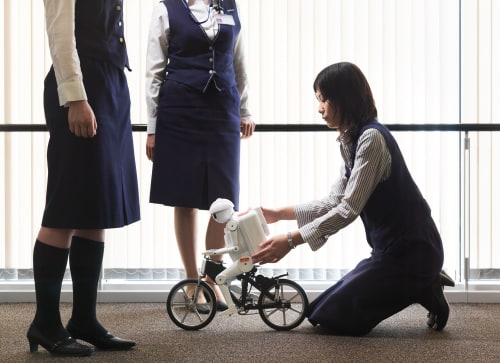
![Vincent Fournier, Anechoic Chamber, European Space Research and Technology Centre [ESTEC], Noordwijk, The Netherlands, 2008](https://artlogic-res.cloudinary.com/w_600,c_limit,f_auto,fl_lossy,q_auto/artlogicstorage/theravestijngallery/images/view/3c794253564b0acc41fb804f36b203ccj/theravestijngallery-vincent-fournier-anechoic-chamber-european-space-research-and-technology-centre-estec-noordwijk-the-netherlands-2008.jpg)
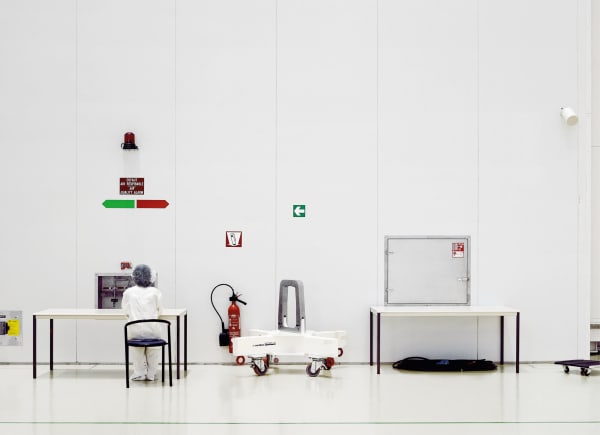
![Vincent Fournier, Baikonur City #2 [Unknown Fields Division], The International Space School VN Chelomey, Kyzylorda, Kazakhstan, 2011](https://artlogic-res.cloudinary.com/w_600,c_limit,f_auto,fl_lossy,q_auto/artlogicstorage/theravestijngallery/images/view/a2112c9e5c2125f0a9620ee22c83d1b2j/theravestijngallery-vincent-fournier-baikonur-city-2-unknown-fields-division-the-international-space-school-vn-chelomey-kyzylorda-kazakhstan-2011.jpg)

![Vincent Fournier, General Boris V., Yuri Gagarin Cosmonaut Training Center [GCTC], Star City, Zvyozdny Gorodok, Russia, 2007](https://artlogic-res.cloudinary.com/w_600,c_limit,f_auto,fl_lossy,q_auto/artlogicstorage/theravestijngallery/images/view/c56acfc31296a38f5df8d8587bc48ab6j/theravestijngallery-vincent-fournier-general-boris-v.-yuri-gagarin-cosmonaut-training-center-gctc-star-city-zvyozdny-gorodok-russia-2007.jpg)
![Vincent Fournier, HRP-2 #1 [Kawada], Promet Developed by AIST, Tochigi, Japan, 2010](https://artlogic-res.cloudinary.com/w_600,c_limit,f_auto,fl_lossy,q_auto/artlogicstorage/theravestijngallery/images/view/19288fe57b6a576b4440d288daca4a83j/theravestijngallery-vincent-fournier-hrp-2-1-kawada-promet-developed-by-aist-tochigi-japan-2010.jpg)
![Vincent Fournier, Kobian Robot #1 [Takanishi Laboratory], Waseda University, Tokyo, Japan, 2010](https://artlogic-res.cloudinary.com/w_600,c_limit,f_auto,fl_lossy,q_auto/artlogicstorage/theravestijngallery/images/view/ca8ea59a71f3f9031a66854d45098723j/theravestijngallery-vincent-fournier-kobian-robot-1-takanishi-laboratory-waseda-university-tokyo-japan-2010.jpg)
![Vincent Fournier, Moon Valley, Atacama desert, Lunar Robotic Research [NASA], Chile, 2007](https://artlogic-res.cloudinary.com/w_600,c_limit,f_auto,fl_lossy,q_auto/artlogicstorage/theravestijngallery/images/view/edfff725bb5259d11b3c06a5098a8616j/theravestijngallery-vincent-fournier-moon-valley-atacama-desert-lunar-robotic-research-nasa-chile-2007.jpg)
![Vincent Fournier, Reem B #8 [Pal], Barcelone, Spain, 2010](https://artlogic-res.cloudinary.com/w_600,c_limit,f_auto,fl_lossy,q_auto/artlogicstorage/theravestijngallery/images/view/7f59f4f4392943ab440bf22b022477f7j/theravestijngallery-vincent-fournier-reem-b-8-pal-barcelone-spain-2010.jpg)
![Vincent Fournier, SOUSY Svalbard Radar [SSR], Svalbard, Norway, 2010](https://artlogic-res.cloudinary.com/w_600,c_limit,f_auto,fl_lossy,q_auto/artlogicstorage/theravestijngallery/images/view/cbec7d6a567015f21845e2c1639647abj/theravestijngallery-vincent-fournier-sousy-svalbard-radar-ssr-svalbard-norway-2010.jpg)
![Vincent Fournier, The Man Machine Reem B #2 [Pal], Barcelone, Spain, 2010](https://artlogic-res.cloudinary.com/w_600,c_limit,f_auto,fl_lossy,q_auto/artlogicstorage/theravestijngallery/images/view/36701bcf39726ac902e2950d811a81d2j/theravestijngallery-vincent-fournier-the-man-machine-reem-b-2-pal-barcelone-spain-2010.jpg)


![Vincent Fournier, Twendy-One robot and Professor Shigeki Sugano, [Sugano Laboratory], Waseda University, Tokyo, Japan, 2010](https://artlogic-res.cloudinary.com/w_600,c_limit,f_auto,fl_lossy,q_auto/artlogicstorage/theravestijngallery/images/view/3b5e5bbcd6aadc6c5163d0d334122457j/theravestijngallery-vincent-fournier-twendy-one-robot-and-professor-shigeki-sugano-sugano-laboratory-waseda-university-tokyo-japan-2010.jpg)
